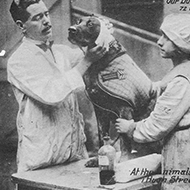
A new survey on people and pets' connection marks the occasion.
Marking 125 years of charity work, national pet charity Blue Cross has released the results of a new survey, demonstrating the deep-rooted and important connection between people and pets.
Of the respondents, 40 per cent said that their early pets were their fondest childhood memory, over 60 per cent said that the pandemic made them realise the importance of owning a pet, and 42 per cent agreed that owning a pet is vital to combatting loneliness.
With the increase in pet ownership across the UK, the work that Blue Cross does to support pets and people through rehoming, veterinary, animal behaviour and pet bereavement services is just as necessary as the charity's early work supporting the working horses of London.
Kerry Taylor, Education Manager at Blue Cross, commented on the importance of the charity's work after 125 years: “We are very proud of our heritage and the work the charity does in 2022.
“We are needed today more than ever, with people seeking help after an impulse purchase of a pet online from unscrupulous sellers. Something which sadly we know increased during the pandemic, with pet theft and scams online escalating and costs for puppies rocketing into the thousands.
“We strongly advise anyone thinking of getting a pet to look at a rescue who has been fully assessed and checked by a vet before adoption. If buying a puppy, then we strongly recommend thorough research before hitting the ‘buy now’ button online.”
Since the charity's formation in 1897, the Blue Cross estimates that 38 million lives have been impacted by its work, with plans to support over 120,000 pets over the next three years.
Image (C) Blue Cross



 The Veterinary Medicines Directorate (VMD) is inviting applications from veterinary students to attend a one-week extramural studies (EMS) placement in July 2026.
The Veterinary Medicines Directorate (VMD) is inviting applications from veterinary students to attend a one-week extramural studies (EMS) placement in July 2026.